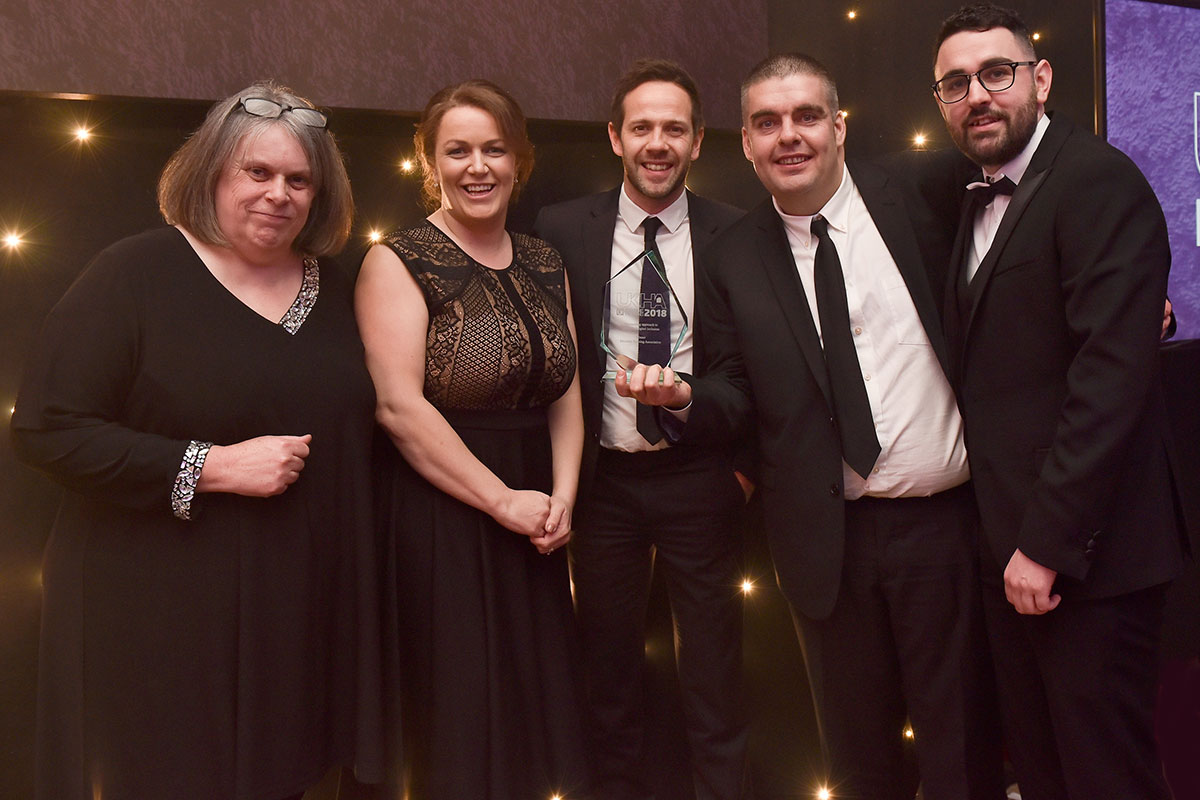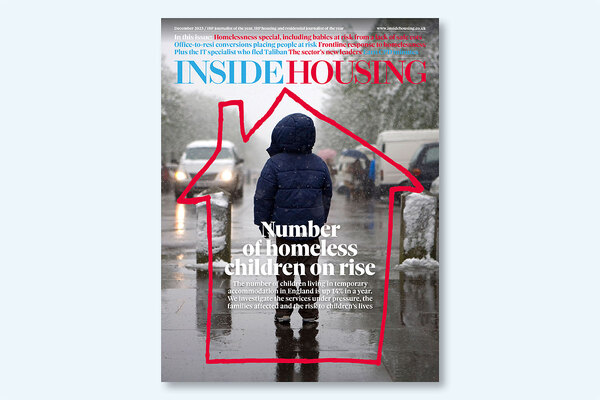Why they won: a closer look at all the winning UK Housing Awards entries
We explain more about the winning entries in this years UK Housing Awards.
The winners of the 2018 UK Housing Awards were revealed earlier this month at a ceremony in London.
A total of 17 awards were handed out at the event.
Today we reveal more information about the winning entries, the judging process and who the judges were.
The UK Housing Awards, run by Inside Housing and the Chartered Institute of Housing, is the largest and longest running awards in the sector and is now in its third decade.
Click here to register your interest in next years awards
Scroll down for information on the winning entries:
Judging process
In 2018, Inside Housing and the Chartered Institute of Housing worked with more than 50 of the most prominent housing experts to judge 327 entries across 17 categories.
Judges were drawn from a wide range of influential organisations and institutions, including the House of Lords, the Civil Service, the voluntary sector, academia and representative organisations such as the Chartered Institute of Public Finance and Accountancy.
Each category was assessed by a panel of relevant experts, who drew up a shortlist.
Finalists from each category were required to present their entries to judges in a tough face-to-face interview. This process gave our judges a unique opportunity to put every organisation through its paces and to find the very best performers.
When the UK Housing Awards were launched more than two decades ago, they were the first in the sector to recognise and celebrate excellence. Today they remain the largest and most prestigious awards across the housing world.
Our rigorous judging process ensures the winners really are the best of the best.
Development PROGRAMME OF THE YEAR (UNDER 12,000 HOMES)
CROSS KEYS HOMES
- This Peterborough-based association plans to build 2,000 homes by 2021
- Innovative funding methods have supported a growth in development
- Two recently formed joint ventures will provide the foundation for further development
In its first 10 years, Peterborough-based Cross Keys Homes built 1,000 homes. It is now on track to build 2,000 more by 2021, meeting the increasing need both of the citizens of its home town – Peterborough is the third fastest growing city in the UK – and the broader East of England region.
Such a development acceleration has not been at the cost of either the association’s financial stability or its respect for the environment, however. In 2014, it secured the sector’s first ever ‘green’ bond. The bond, which raised nearly £150m, carries an environmental, social and governance accreditation and Cross Keys Homes says this has cemented its commitment to building communities which protect the environment for future generations.
Two joint ventures are now set to further the association’s development work. The first, with Kier Living, centres on 13 large development sites – already owned by Kier – on which around 1,300 homes will be built for open market sale. The profit generated will be invested in creating more affordable homes.
A partnership with Peterborough City Council, meanwhile, has led to the formation of registered company Medesham Homes. Its specific purpose is to deliver more affordable properties in the city.
The judges said:
“Cross Keys Homes has impressively used its asset base, innovated through a green bond and forged strong links to social purpose and community investment. It has established strong joint ventures to stretch its development capacity.”
Highly commended
Thrive Homes
This category was judged by
Rod Cahill, chief executive, Catalyst Housing
Steve Close, group chief executive, Together Housing Group
Jon Lloyd-Owen, service director – housing, Cornwall Council
DEVELOPMENT PROGRAMME of the year (OVER 12,000 HOMES)
HOME GROUP
- Home Group doubled its output within two years
- It now plans to deliver more than 11,000 new homes in five years
- There are 11 joint ventures supporting these plans
In 2015, Home Group launched a new strategy through which it planned to double its housing output within four years. It did so in two. With the association now expecting to build more than 11,000 new homes over the next five years – that equates to eight new homes every day – it is a development growth trajectory that is only set to accelerate.
Its joint ventures have accelerated, too. As little as 18 months back, Home Group only had one such set-up in place. But it now has 11 joint ventures with large-scale partners such as Countryside, Galliford Try and Morgan Sindall – all of which are reported to be enabling quicker access to the market
and an increased pace for the development programme. It anticipates the joint ventures will support the construction of 12,000 new homes in themselves, including 4,200 affordable properties.
The association reports that its growth in development activity has not stunted its ability to be innovative. In the past year, it has launched its ‘Flexi Rent’ model, through which rental incomes within a building can be flexed between sub-market and market rent depending on market conditions and customer income.
The judges said:
“Home Group demonstrated impressive scale and vision, [centred on] the clear delivery of affordable housing.”
Highly commended
DCH (now Liverty); Nottingham City Homes, Nottingham City Council and Robert Woodhead
This category was judged by
Matthew Bailes, chief executive, Paradigm Housing Group
John Betty, strategic director – economic growth and development, Cornwall Council
Natalie Elphicke, chief executive, Housing & Finance Institute
John Knight, assistant director of housing, Thurrock Council
INNOVATION OF THE YEAR (Over 12,000 HOMES)
NOTTINGHAM CITY HOMES
- Many of Nottingham City Homes’ properties were built in the middle of the last century
- They are therefore a long way from meeting modern levels of energy efficiency
- Adopting a new approach to retrofitting housing solutions has addressed this challenge
Given many of Nottingham City Homes’ 27,500 properties were built in the middle of the last century, they present a significant challenge when it comes to reaching modern levels of energy efficiency. To address this, the organisation has become the first in the UK to adopt the Energiesprong approach to retrofitting housing solutions.
Pioneered in the Netherlands, Energiesprong upgrades a home with a manufacturing solution that includes new external walls, new windows, a solar roof, and a state-of-the-art heating system. The aim is to reduce the energy required to heat a home.
The panels are manufactured offsite and craned onto the properties in a matter of days, significantly reducing both the time required to insulate a property and the inconvenience for the people who call it home.
Energiesprong uses a whole-life approach to finance, with the price of the works equal to the expected planned maintenance costs and energy savings over a 30-year period.
Following a successful pilot with 10 homes in Sneinton – among the 10% most deprived neighbourhoods in England – the hope is now to roll out the model to a further 400 properties.
The judges said:
“Clear partnership working. Innovation from the client and contractor, providing a real benefit to customers.”
Highly commended
Flagship Group
This category was judged by
Ruth Cooke, chief executive, Clarion Housing Group
Matthew Horne, acting chief executive, Innovation Unit
Eamon McGoldrick, managing director, National Federation of ALMOs
Sponsored by
![]()
INNOVATION of the year (Under 12,000 homes)
TRIVALLIS AND SOUTH WALES POLICE
- Trivallis and South Wales Police created a way of sharing information on anti-social behaviour
- The housing association receives early notification of any incidents involving its residents
- The set-up makes it possible to intervene much earlier
Anti-social behaviour is an issue that concerns housing associations and law enforcement alike, and in the South Wales borough of Rhondda Cynon Taf the two are working more closely than ever to address it.
Trivallis, one of Wales’ largest housing associations, joined with South Wales Police and Cardiff Council to develop an information sharing platform. Addresses for Trivallis properties are uploaded onto the system, and the police force’s anti-social behaviour co-ordinators then extract any cases relating to people living there.
Staff at the housing association are sent the information on a daily basis, allowing them to speedily identify any recurring issues. Housing managers can then work with police colleagues to identify vulnerable individuals and to try to resolve any problems.
The scheme is said to have led to more effective and earlier intervention, resulting in an improved service for tenants and increased safety within communities. Initially the work with Trivallis was a pilot. But it has proved so successful that the set-up is now being introduced by 14 other social landlords and councils.
The judges said:
“Priceless work [around] early intervention. Clever, really well presented, with scalability. Something simple done well.”
Highly commended
Locality Solutions
This category was judged by
Brian Cronin, chief executive, Your Housing Group
Aileen Evans, chief executive, Grand Union Housing Group
Paul Fiddaman, group chief executive, Karbon Homes
Sponsored by

Outstanding APPROACH TO REGENERATION
KENT COUNTY COUNCIL
- Kent had 9,000 empty homes in 2005
- The council introduced a No Use Empty initiative
- The scheme has now returned 5,276 homes to use
According to national charity Empty Homes, there are enough unoccupied properties in the UK to house half of the families on waiting lists for housing. In 2005, 9,000 of those properties were in Kent. But the No Use Empty (NUE) initiative saw that number fall to 4,999 by October 2016.
The scheme is delivered by a virtual team, with its members working from different locations and employed by a number of bodies. Prior to its launch, district councils were dealing with empty properties in a piecemeal fashion and often had a lack of understanding of how best to return them to use.
And so NUE offers training on the legislative and enforcement issues concerning empty homes. The council also provides £6m of funding in the form of short-term secured interest-free loans to encourage owners of empty properties to bring them back into use.
The scheme has returned 5,276 homes to use. Identifying empty commercial properties with planning permission has, meanwhile, enabled NUE to create 566 entirely new homes – so generating £700,000 each year in additional council tax receipts.
The judges said:
“This scheme is doing more than just bringing empty homes back into use – there was evidence that it is having much broader impacts, particularly on the local economy.”
Highly commended
Trivallis
This category was judged by
David McQuade, chief executive, Flagship Housing Group
Richard Meier, former partner, Argent (Property Development) Services
Nigel Wilson, group chief executive, Wythenshawe Community Housing Group
Sponsored by

OUTSTANDING APPROACH TO COMMUNICATION (UNDER 10,000 HOMES)
HABINTEG HOUSING ASSOCIATION
- Habinteg Housing Association launched its #ForAccessibleHomes campaign in 2016
- It used tenant stories to illustrate the importance of accessible homes
- Ultimately, the campaign helped secure a change in the law
There are 11.6 million disabled people in Britain, yet just 7% of homes offer even basic accessibility features. Staff at Habinteg Housing Association are absolutely determined to change that second figure and so in 2016 they launched the #ForAccessibleHomes campaign.
Through a range of content, and via events such as coffee mornings held up and down the country, the campaign told the stories of those with an interest in accessible housing. That included tenants, who explained in powerful blog posts and videos just why housing is so important in enabling those with disabilities to live independently.
The campaign quickly gained media attention, with coverage in both the specialist housing press and in magazines focused on accessibility issues. It also captured the attention of MPs.
Habinteg – with a public affairs consultancy partner – successfully lobbied for two parliamentary inquiries. Subsequently, work with Heidi Allen MP resulted in an amendment to the Neighbourhood Planning Act. It now requires the secretary of state to issue guidance on how local development documents should address housing needs resulting from old age or disability.
The judges said:
“In conceiving the #ForAccessibleHomes campaign, Habinteg has created a clear and focused project aligned perfectly with the goals of the organisation, and one which has had a significant and demonstrable impact.”
Highly commended
#UKHousingFast
This category was judged by
Steve Coffey, chief executive, Liverpool Mutual Homes
Zoe Forster, chief executive, Dumfries and Galloway Housing Partnership
OUTSTANDING APPROACH TO COMMUNICATION (OVER 10,000 HOMES)
ASTER GROUP
- Aster Group released a report about how shared ownership could help address the housing crisis
- It was based on an in-depth survey and interviews with leading industry figures
- It garnered 40 print media articles, as well as radio coverage
In September 2017, Aster Group – a housing developer and landlord in the South of England – published a report entitled Another Way: How Shared Ownership Can Improve the UK Housing Market. Its intention was to help find solutions to the housing crisis in the UK, and its view was that shared ownership has a significant part to play.
The challenge, the report suggests, is that too few people appear to know what shared ownership is. That conclusion was based on specially commissioned research by YouGov. Of the 2,000 people contacted, half thought the term meant living with someone else and a quarter believed it was an option only open to existing tenants.
A report microsite, press release activity, and contact with MPs helped ensure that the report’s release gained significant levels of attention. It resulted in 40 press articles, including major coverage by personal finance writers in The Sun, The Express and The Mirror, and extensive coverage in the trade press. Meanwhile Jane Gallifent, development and sales director at the association, gave radio interviews that were broadcast on 15 stations.
Staff at the association report that a number of media outlets are now interested in longer-term coverage of the report and the issues it raises.
The judges said:
“Ambitious but clearly defined goals and impressive results using a wide range of channels. The commitment to making sure colleagues understood the importance of the campaign to Aster’s overall social purpose was also impressive.”
Highly commended
Riverside and partners
This category was judged by
John Clark, chief executive, Plymouth Community Homes
Mark Henderson, chief executive, Home Group
Catriona Simons, group chief executive, Guinness Partners
Outstanding APPROACH TO INCOME MANAGEMENT
POPLAR HARCA
- Poplar Harca, based in east London, introduced specific financial support services for leaseholders
- Teams have worked to grasp leaseholders’ financial stressors, and locally available support
- Historic debt has now halved
Financial inclusion support for tenants is a well-established principle across the social housing sector. But leaseholders – many of whom are asset rich but cash poor – are often overlooked. East London-based Poplar Harca has been changing that. In 2016, the organisation set up a new collections team with an ethos to support leaseholders. Its activity is grounded in a belief that those who are in arrears are either having financial problems and so need support, or think debts will not be chased and so ignore their bills.
Leaseholders are now told that the organisation will always take action to recover debts – but also that continuous support is available if they are having problems paying. Members of the new collection team forged connections with local experts to better understand leaseholders’ financial stressors, with in-house training on leaseholder needs organised for those working in other teams. The organisation has also formed a partnership with local anti-poverty support agency Toynbee Hall.
In the past 18 months, these efforts have helped halve historic debt to Poplar Harca. In 2016/17, the team collected £6m compared with £4m in the previous financial year.
“Transformational improvement over a short period in a notoriously difficult area – leasehold management – in an inner city environment, subject to extensive and expensive regeneration.”
This category was judged by
Helen Evans, chief executive, Network Housing Group
Keith Exford, former chief executive, Clarion Housing Group
Gary Fulford, group chief executive, WHG
Sponsored by

OUTSTANDING APPROACh TO MEETING SPECIALiST HOUSING NEEDS (UNDER 5,000 HOMES)
CALICO HOMES AND SAFENET, PART OF THE CALICO GROUP
- Women experiencing domestic violence and with complex needs lacked appropriate refuge support
- A bespoke recovery refuge was constructed to meet such needs
- The project was a collaboration between several parts of Calico Group
For the past four decades, SafeNet has provided refuges for victims and survivors of domestic abuse across Lancashire. But for many years, the charity – part of the Calico Group – was unable to accept referrals for women with highly complex needs.
Staff knew women dealing with abuse alongside issues such as mental or physical ill health, drug or alcohol dependency, self-harm, or a record of criminal offences desperately needed their help. But a generic refuge just wasn’t suitable, and set up women to fail if they had to be evicted.
During 2011/12, some 41% of referrals had to be refused due to complex needs. It meant that many of the most vulnerable women and children in the area had to remain in dangerous homes for want of an appropriate place of safety.
It was this need that spurred the development of Jane’s Place, a specialist recovery refuge named in memory of Jane Clough, who was murdered by her ex-partner in 2010.
The centre was a collaboration between different parts of the Calico Group. Calico Homes project managed the construction, which was completed by Ring Stones. The refuge is managed by SafeNet, and opened its doors on 1 July 2017, ready to support one of society’s most vulnerable groups.
The judges said:
SafeNet had a really clear sense of purpose, driven by not wanting to turn away the most vulnerable women. They tackled a problem which looked insoluble and found a solution.”
Highly commended
Phoenix Futures
This category was judged by
Yvonne Arrowsmith, chief executive, East Thames Housing Group
Alison Inman, president, Chartered Institute of Housing
Bruce Moore, chief executive, Housing & Care 21
Outstanding APPROACH TO MEETING SPECIALIST HOUSING NEEDS (OVER 5,000 HOMES)
CURO
- Wellbeing House, run by Curo with Virgin Care, supports those experiencing mental health distress
- It aims to help people through a crisis and prevent any future crises
- Evidence suggests it reduces unplanned hospital admissions for mental ill health
In Bear Flat, a peaceful neighbourhood in the south of Bath, is a three-bedroom Victorian house which is helping people experiencing mental ill health. Wellbeing House is run by Curo, a housing association and support provider, and by local community health provider Virgin Care. Free to those who use it, the house provides a retreat and place of sanctuary in which people can be supported to overcome a mental health crisis. As well as helping people cope with whatever has provoked the crisis, staff at the house help individuals develop strategies to prevent future crises.
The set-up is funded by Bath and North East Somerset Council and was specifically developed with a view to better meeting local need. With its focus on prevention, the aim was to reduce the number of people who find themselves needing unplanned hospital care due to mental ill health. Curo says Wellbeing House has done just that: providing savings by preventing hospital admissions. In 2017, the association claimed it delivered a social return of £228,000 – £5.55 for every £1 invested.
The judges said:
“Genuinely innovative and original but simple in concept, it provides a preventative service that clearly saves other service areas significant sums of money.”
Highly commended
Knightstone (now Liverty)
This category was judged by
Lord Richard Best, chair, All-Party Parliamentary Group on Housing and Care for Older People
Neil Revely, co-chair, Association of Directors of Adult Social Services Housing Policy Network
LANDLORD of the year
NOTTINGHAM CITY HOMES
- Nottingham City Homes has funded a multitude of community projects
- A community mediation service provides skills development, as well as a way of resolving disputes
- The Fit in the Community initiative has supported 5,000 people to live healthier lives
Nottingham City Homes is a large housing provider, managing 27,500 homes in this East Midlands city. But the work of the organisation demonstrably goes beyond bricks and mortar and right to the people living within the properties it manages.
Through the organisation’s 10 Year Anniversary Fund, for instance, community groups were invited to bid for funding to develop projects and events. The result was that around £100,000 was invested in Nottingham’s most deprived areas over the course of a year. Some 26 celebration events and 23 larger projects showcased residents’ creativity and resourcefulness, including everything from photography exhibitions to initiatives focused on training or job opportunities.
Through its Fit in the Community initiative, the organisation has also supported more than 5,000 people to live healthier lives. And its community mediation service, launched in November 2015, is providing an impartial conflict resolution service run by volunteers. Through working for the service, 19 resident volunteers have gained accredited mediation qualifications. Two of the original team have now gone on to set up their own businesses.
The judges said:
“Truly a tenant-led organisation, with tenants making up the majority of the board. It has invested in staff to deliver an excellent landlord service, driven by ambitious targets and a strong corporate plan.”
Highly commended
RHP Group
This category was judged by
Terrie Alafat, chief executive, Chartered Institute of Housing
Julian Ashby, chair, Paradigm, and former chair, Homes and Communities Agency Regulation Committee
Emma Maier, editor-in-chief, Inside Housing
Ian Munro, chief executive, New Charter Group
Sponsored by

Outstanding APPROACH TO REPAIRS AND MAINTENANCE
WATES LIVING SPACE AND BIRMINGHAM CITY COUNCIL
- In 2016, Wates Living Space was appointed to deliver social housing maintenance in Birmingham
- An extensive training programme ensured a fully engaged workforce
- Both service efficiency and customer satisfaction have steadily increased
In 2016, Wates Living Space was appointed to deliver Europe’s largest social housing maintenance contract for Birmingham City Council. It covers 31,000 properties across the city and encompasses repairs, voids, gas and capital works. Yet the partners report that the new set-up was up and running in
just three months, and that productivity and customer satisfaction have both significantly increased.
Engaging a disenfranchised workforce is said to have been key to this success. An extensive training and induction programme was created; a successful consultation process was run on previously controversial changes to staff terms and conditions; and a new focus on efficiency was embedded among the workforce. At the same time, three new IT systems were introduced to help run the service more smoothly.
Customer satisfaction levels have steadily climbed – notably reaching 99.9% in October 2017 – and formal complaints have dropped from 2% to just 0.2%. Productivity has dramatically improved, with each worker now completing an average of 3.4 jobs a day, compared with the previous 2.2. Under the new contract, 110,000 repairs are now being delivered each year.
The judges said:
“Outstanding customer service and satisfaction when tasked with scaling up their repairs and maintenance operations in a short period of time.”
This category was judged by
Paul Crawford, group chief executive, Liverty, and former chief executive, DCH
Paul Dolan, chief executive, Accent Group
Julie Doyle, chief executive, Longhurst Group
Sponsored by

Outstanding APPROACH TO TACKLING HOMELESSNESS
ST BASILS
- A partnership with a local NHS trust offers accommodation and employment to young people
- Participants live in a property across the road from the hospital, and are apprentices within the NHS
- Many have subsequently secured long-term employment
Bringing disused property back into use while also providing accommodation and employment opportunities for at-risk young people is no mean feat, but St Basils is delivering a scheme which does just that.
Live and Work is a collaboration between the charity and Sandwell and West Birmingham Hospitals NHS Trust. The scheme provides accommodation for 32 young people in a property just over the road from Sandwell General Hospital. All were either previously homeless or at risk of being so, and are provided not only with accommodation but with an apprenticeship at the hospital trust. Light touch support from St Basils helps develop participants’ confidence, and increases the likelihood they continue in their apprenticeship.
Of the first few to complete the scheme, three secured permanent roles at the trust; four secured flexible working at the organisation; and one gained work elsewhere.
The advantages for individuals are matched by wider benefits, not least to public finances given reduced reliance on state benefits and additional tax revenues.
The judges said:
“The Live and Work scheme is doing something different and innovative and its impact was well evidenced. The opportunities it provides are life-changing for some young people.”
Highly commended
Carmarthenshire County Council
This category was judged by
Kevin Rodgers, chief executive, WM Housing Group
Ann Santry, chief executive, Sovereign Housing Association
Dame Clare Tickell, chief executive, Hanover Housing
Sponsored by

Outstanding APPROACH TO TENANT INVOLVEMENT
NOTTINGHAM CITY HOMES
- With five of its board members also residents, this ALMO encourages tenant engagement at all levels
- A Tenant Academy offers training courses as well as social activities
- The Fit in the Community scheme supports residents to bolster their health and well-being
Check the biographies of the board members at Nottingham City Homes (NCH), and something quickly becomes evident: an awful lot of them (five out of 12, in fact) are tenants. It is said to be an indication of the extent to which tenant engagement permeates at Nottingham City Council’s ALMO.
Engagement is not only focused on decision-making. It is also centred on well-being. A Tenant Academy, for instance, offers free learning and development courses – on everything from bookkeeping, to IT, to general skills – alongside social groups.
The impact of the Tenant Academy can be seen in the stories of many of those who have attended. One resident had been unemployed but had a dream of making and selling Caribbean food. A course gave him the confidence to set up a market stall, which provides a living for him and now employment for his son.
The Fit in the Community scheme, meanwhile, supports residents to first take part in and then run fitness initiatives in their communities. The result is a reduction in social isolation, and an increase in community involvement, and health and well-being.
The judges said:
“Tenants have clearly influenced services and are integral to decision-making. NCH offers a creative range of ways to engage including ‘golden games’, intergenerational boxing and cooking.”
Highly commended
Red Kite Community Housing
This category was judged by
Matthew Harrison, chief executive, Great Places Housing Group
Richard Hill, group chief executive, One Housing Group
Jenny Osbourne, chief executive, Tpas
Sponsored by

STRATEGIC LOCAL AUTHORITY OF THE YEAR
HULL CITY COUNCIL
- The council is creating new homes through partnership working and use of land in priority areas
- It runs extensive engagement and financial inclusion programmes for tenants and residents
- Preventing homelessness is another key strand of its housing strategy
Hull City Council has 25,000 retained homes, but the city’s local plan identifies a need for 620 new homes annually. It is a figure which is regularly being not just met but exceeded, thanks to partnership working and what is described as a positive use of land in priority areas so as to develop housing for sale and rent.
This approach has accounted for 30% of all new development in Hull, delivering 3,000 homes and a pipeline for 2,500 more. This year alone there are agreements to deliver 900 homes, and complete 220 new council houses.
The city’s housing strategy is centred on a belief that the right housing choices help people to lead happy and fulfilling lives. And so it runs an extensive engagement programme for tenants and residents. There are also significant efforts on financial inclusion, with work to create jobs, apprenticeships and training opportunities. The council’s partnership contracts, for instance, require that 80% of the workforce live in HU postcodes.
Preventing people from becoming homeless is another key aspect of the council’s strategy. Early intervention is promoted via a walk-in service, which is reported to have helped prevent 29,007 potential instances of homelessness.
The judges said:
“Strong evidence of systematic and holistic join-up across housing and the full range of related areas, from children’s services to practical infrastructure.”
This category was judged by
Elizabeth Austerberry, chief executive, Moat Homes
Keith House, leader, Eastleigh Borough Council
Ken Lee, chair, Chartered Institute of Public Finance and Accountancy Housing Panel
Sponsored by

outstanding APPROACH TO PROMOTING DIGITAL INCLUSION
RHONDDA HOUSING ASSOCIATION
- Some 73,000 people in the Rhondda area are thought to be digitally excluded
- The association set up a programme to help staff and tenants increase their confidence with digital
- Efficiency and social inclusion have increased as a result
Rhondda Cynon Taf is one of the most deprived boroughs in Wales. More than half of the working-age population have no qualifications, compared with 33% nationally. As more and more services go online, those who are not computer literate – and who may already have challenges in engaging with services or gaining employment – are at risk of missing out further.
With 73,000 people in the area believed to be digitally excluded, staff at Rhondda Housing Association knew they had to act. Cue the introduction of the organisation’s digital inclusion programme, aimed at making a difference for staff and tenants alike.
Through the programme, all employees have been given smartphones and tablets, making it possible to work more flexibly. Among the results: a reduction of half a tonne of carbon dioxide emissions per quarter from reduced need for staff to travel to work, and a 49% reduction in printing. Two hours are said to have been saved per staff member per day thanks to the elimination of paperwork and unproductive travel.
Tenants, meanwhile, have benefited from measures including ‘Tea, Talk and Tech’ roadshows. More than 150 people attended these sessions in 18 months, with activities like family tree research and setting up social media as a means to bolster digital literary. One tenant has even been supported to set up her own community interest company around digital inclusion.
The judges said:
A standout winner. Rhondda is a small organisation but it certainly has packed a punch in its approach to digital inclusion.”
Highly commended
Fortem
This category was judged by
Geraldine Howley, group chief executive, Incommunities
Jon Lord, group chief executive, Bolton at Home
Mark Thompson, director of economy and environment, Calderdale Council
OUTSTANDING APPROACH TO EQUALITY AND DIVERSITY
QUEENS CROSS HOUSING ASSOCIATION
- Research showed a strong Chinese population in Glasgow’s Woodside neighbourhood
- It also showed many members did not have connections with the housing association
- The Sharing Lives, Sharing Spaces project now offers a range of support and activities
When Queens Cross Housing Association carried out some social research on its residents and tenants, it revealed something important about one of its neighbourhoods. It transpired that no less than one in five of those living in Glasgow’s Woodside area were of Chinese ethnic origin – and, worryingly, that they were not particularly well engaged with the association.
And so the Sharing Lives, Sharing Spaces project was born. It offers free English classes and access to a full-time bilingual support worker. There are also social and well-being events, including cookery and computer classes, a music group, a homework café, and sports programmes for young people and families.
The project is said to have not only helped the Chinese community feel more at home in Glasgow – not least through increasing access to housing services and community activities – but also raised awareness of the positive contribution the community makes to the city.
Many have found that February’s Chinese New Year helps brighten the long Scottish winter, not least because the project organises special celebrations which include both Chinese and Scottish dancing.
The judges said:
“A simple model that all housing associations could learn from. Community integration is a big issue of our time and this small association is way ahead.”
Highly commended
Quo Vadis Trust
This category was judged by
Chan Kataria, chief executive, EMH Group
Jess McCabe, features editor, Inside Housing
Barbara Spicer, chief executive, Plus Dane Housing
Judges
Terrie Alafat, chief executive, Chartered Institute of Housing
Julian Ashby, chair, Paradigm, and former chair, Homes and Communities Agency Regulation Committee
Lord Richard Best, chair, All-Party Parliamentary Group on Housing and Care for Older People
Ruth Cooke, chief executive, Clarion Housing Group
Alison Inman, president, Chartered Institute of Housing
Sally Randall, director of housing standards and support, Ministry of Housing, Communities and Local Government
Eamon McGoldrick, managing director, National Federation of ALMOs
Matthew Bailes, chief executive, Paradigm Housing Group
Chan Kataria, chief executive, EMH Group
Dame Clare Tickell, chief executive, Hanover Housing
Yvonne Arrowsmith, chief executive, East Thames Housing Group
Elizabeth Austerberry, chief executive, Moat Homes
John Betty, strategic director – economic growth and development, Cornwall Council
Rod Cahill, chief executive, Catalyst Housing
John Clark, chief executive, Plymouth Community Homes
Steve Close, chief executive, Together Housing Group
Steve Coffey, chief executive, Liverpool Mutual Homes
Paul Crawford, group chief executive, Liverty, and former chief executive, DCH
Brian Cronin, chief executive, Your Housing Group
Paul Dolan, chief executive, Accent Group
Julie Doyle, chief executive, Longhurst Group
Natalie Elphicke, chief executive, Housing & Finance Institute
Aileen Evans, chief executive, Grand Union Housing Group
Helen Evans, chief executive, Network Housing Group
Keith Exford, former chief executive, Clarion Housing Group
Paul Fiddaman, group chief executive, Karbon Homes
Zoe Forster, chief executive, Dumfries and Galloway Housing Partnership
Gary Fulford, group chief executive, WHG
Matthew Harrison, chief executive, Great Places Housing Group
Mark Henderson, chief executive, Home Group
Richard Hill, chief executive, One Housing Group
Matthew Horne, acting chief executive, Innovation Unit
Keith House, leader, Eastleigh Borough Council
Geraldine Howley, group chief executive, Incommunities
John Knight, assistant director of housing, Thurrock Council
Ken Lee, chair, Chartered Institute of Public Finance and Accountancy Housing Panel
Jon Lloyd-Owen, service director – housing, Cornwall Council
Jon Lord, chief executive, Bolton at Home
Emma Maier, editor-in-chief, Inside Housing
David McQuade, group chief executive, Flagship Housing Group
Richard Meier, former partner, Argent (Property Development) Services
Bruce Moore, chief executive, Housing & Care 21
Ian Munro, former chief executive, New Charter Group
Jenny Osbourne, chief executive, Tpas
Professor Anne Power, professor of social policy and head of housing and communities, London School of Economics
Neil Revely, co-chair, Association of Directors of Adult Social Services Housing Policy Network
Kevin Rodgers, chief executive, WM Housing Group
Ann Santry, chief executive, Sovereign Housing Association
Catriona Simons, group chief executive, Guinness Partnership
Barbara Spicer, chief executive, Plus Dane Housing
Gareth Swarbrick, chief executive, Rochdale Boroughwide Housing
Mark Thompson, director of economy and environment, Calderdale Council
Nigel Wilson, chief executive, Wythenshawe Community Housing Group



























